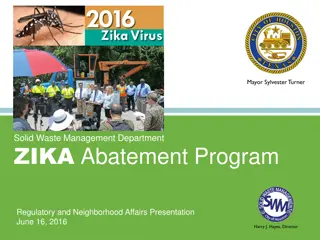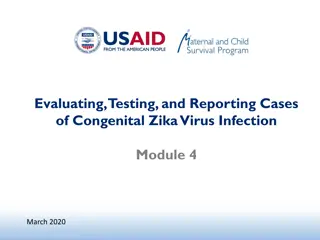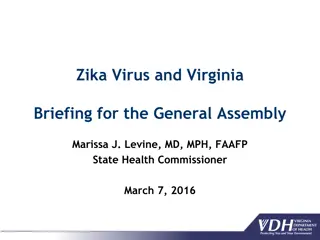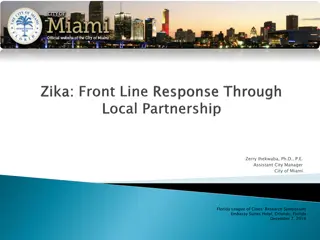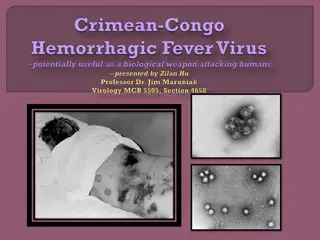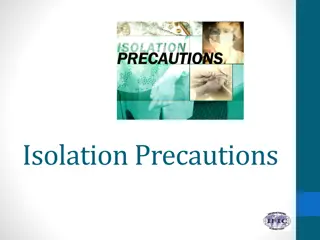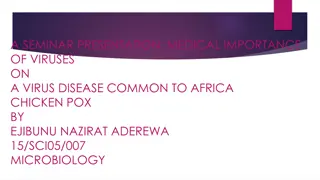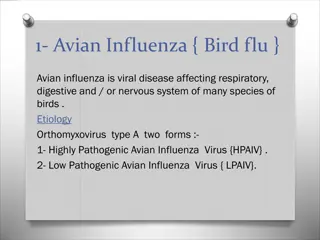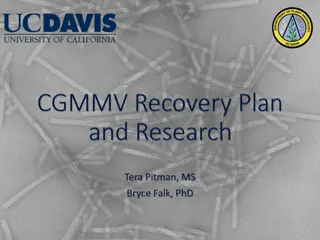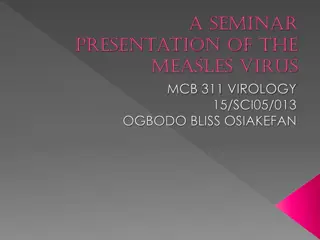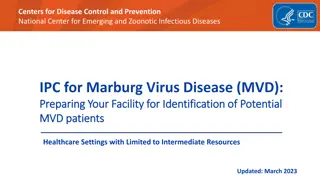Understanding Zika Virus: Risks and Precautions
Zika virus is a mosquito-borne infection that can lead to birth defects and neurologic disorders. It spreads through mosquito bites and can also be transmitted from mother to child during pregnancy or through sexual contact. The virus is prevalent in South and Central America, the Caribbean, and is expected to spread further. Prevention involves avoiding mosquito bites by wearing protective clothing, using insect repellent, and eliminating standing water to control mosquito breeding grounds. Pregnant women or those trying to conceive should avoid areas with active Zika transmission to reduce the risk of infection.
Download Presentation

Please find below an Image/Link to download the presentation.
The content on the website is provided AS IS for your information and personal use only. It may not be sold, licensed, or shared on other websites without obtaining consent from the author. Download presentation by click this link. If you encounter any issues during the download, it is possible that the publisher has removed the file from their server.
E N D
Presentation Transcript
BLUF BOTTOM LINE: - No vaccine exists to prevent Zika - If you live in or travel to an area with ongoing Zika virus transmission, take precautions to minimize risk. - The risk of Zika infection is reduced by taking measures to avoid mosquito bites and sexual contact with men who have been infected with Zika. - Pregnant women or women trying to become pregnant should avoid travel to areas with active Zika virus transmission.
Agenda - - - - - - - What is Zika virus? How is Zika spread? Where is it found? What are the symptoms? What can you do to protect yourself? What about pregnant women? Summary
What is Zika virus? - Zika virus is one of several infections spread by the Aedes mosquito, which also spreads dengue and chikungunya. - Usually a mild illness. - However, Zika can cause birth defects and has been linked to neurologic disorders.
How is Zika spread? - Mainly through mosquito bites. - Less commonly: Mother to child during pregnancy. Infected man to his sex partners. Aedes aegypti Photo: CDC Possibly blood transfusions. The FDA has instituted precautions to protect the US blood supply.
Where is it found? - The current Zika virus transmission area includes much of South and Central America and the Caribbean. - The virus is expected to spread to nearly all countries in the Americas.
What are the symptoms? - About 1 in 5 people infected with Zika becomes ill. - The illness is usually mild and symptoms last from several days to a week.
What can you do to protect yourself? The best way to prevent Zika is to prevent mosquito bites. No vaccine or specific treatments are available to prevent or treat Zika. - Minimize time outside when mosquitos are active. The mosquitoes that spread Zika bite mostly during the daytime Control mosquitoes around the home by eliminating standing water where mosquitoes breed. Empty water from containers such as garbage cans, wading pools, and flower pots. Wear long-sleeved shirts and long pants. Stay in places with air conditioning or use screens that keep mosquitoes outside. Use DEET or picaridin insect repellent on exposed skin. Treat clothing and gear with permethrin or buy permethrin-treated items. - - - - - -
What can you do to protect yourself? Zika virus can spread during sex by a man infected with Zika to his sex partners. It may be possible for a man to carry Zika and give it to his partner(s) through sex, even when he does not have symptoms, or know that he is infected. - Couples that include a man who has been diagnosed with Zika or had symptoms of Zika should consider using condoms or not having sex for at least 6 months after symptoms begin. This includes men who live in and men who traveled to areas with Zika. - Couples that include a man who traveled to an area with Zika but did not develop symptoms of Zika should consider using condoms or not having sex for at least 8 weeks after their return. - Couples that include a man who lives in an area with Zika but has not developed symptoms of Zika should consider using condoms or not having sex while there is Zika in the area.
What can you do to protect yourchildren? If you have a baby or child: - Do not use insect repellents on babies younger than 2 months. - Follow product label instructions. - Dress babies or small children in clothing that covers arms and legs or cover crib, stroller, and baby carrier with mosquito netting. - Do not apply insect repellent to a child s hands, eyes, mouth, or any cuts or irritated skin. - Spray insect repellents onto your hands and then apply to a child s exposed skin.
Soldiers should use the DOD Insect Repellent System Properly wear your uniform: tuck trousers into boots and undershirt into trousers, and wear sleevesdown and snugly fastened at the wrist. Apply DEET or picaridin insect repellent to exposed skin. Wear a factory-treated Army Combat Uniform (ACU Permethrin). Check the tag in your uniform to confirm it is factory- treated. The Army Physical Fitness Uniform (APFU) is not treated with permethrin. Sleep inside a permethrin-treated bed net.
Pregnancy and Zika Virus - Some women infected with Zika while pregnant have had babies born with birth defects such as microcephaly, a condition where a baby is born with an abnormally small head and incomplete brain development. - Women who are pregnant or trying to become pregnant, should avoid travel to areas where Zika transmission is ongoing or talk to their healthcare provider before travelling if travel cannot be avoided.
Pregnancy in areas without active Zika transmission If you are pregnant or trying to become pregnant: - Avoid travel to Zika-affected areas. - If you can t avoid travel, Talk with your healthcare provider before travel. Strictly follow steps to prevent mosquito bites during your stay. Contact your healthcare provider to arrange for testing after your return. During pregnancy, if your partner has travelled to an affected area, prevent sexual transmission of Zika by not having sex or using condoms the right way every time.
Pregnancy in areas with active Zika transmission If you live in an area with active Zika transmission: - See a healthcare provider - Strictly follow steps to prevent mosquito bites. - To prevent sexual transmission of Zika, consider not having sex or using condoms the right way every time during pregnancy. - If you develop Zika symptoms, contact your healthcare provider for testing. - Follow all recommendations for prenatal care. There is no evidence that prior Zika virus infection poses a risk of birth defects in future pregnancies.
Summary: - Personnel are at risk when travelling to or living in areas experiencing ongoing Zika virus transmission. - The risk of Zika infection is reduced by taking measures to avoid mosquito bites and sexual contact with men who have been infected with Zika. - Studies are underway to learn more about Zika.
Contact information for installation resources: Preventive Medicine - ###-#### Pest Control - ###-####
Additional Resources: - Army Public Health Center (Provisional) Zika Virus Webpage: http://phc.amedd.army.mil/topics/discond/diseases/Pages/Zika.aspx - Centers for Disease Control (CDC) Zika Virus http://www.cdc.gov/zika/index.html More information: http://go.usa.gov/cmqvT Approved for public release, distribution unlimited..


